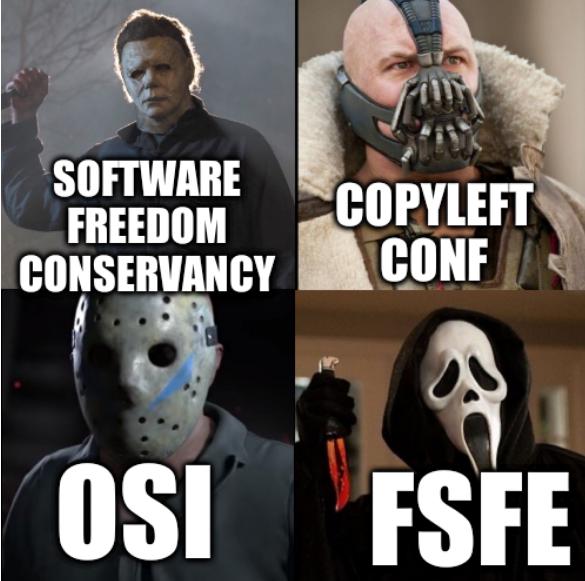

Further to the previous leak, we now have another about "joint OSI/FSF/SFC membership"; SFC is of course the Software Freedom Conservancy, which moved to 'oust' RMS both from within the FSF (Board) and outside it (the SFC's Web site). As we noted only two days ago, Deb from SFC is now moving to become (interim) General Manager of OSI; she took Microsoft money while she was in charge of Copyleft Conf, both in 2019 and in 2020 (shortly before and also some time after receiving an award from FSF (RMS, personally)). What a way to reciprocate, eh?
“An insight into the continuous posturing between free software organizations trying to make themselves look important...”
--AnonymousThe source moreover joked: "Has Techrights ever thought about setting up an affiliate or associate network? Maybe you could stop blogging and just do full time posturing like this..."
Here it is, dated a month before the FSF moved to pressure (again) FSFE to quit misleading people with the "FSF" brand:
Subject: Re: OSI / Affiliate + Associate Date: Sun, 30 Apr 2017 15:27:34 +0000 From: Matthias Kirschner <mk@fsfe.org> To: team@lists.fsfe.org
Dear Erik,
* Erik Albers [2017-02-21 11:20 +0100]:On 20.02.2017 16:27, Matthias Kirschner wrote:* Jan-Christoph Borchardt <hey at jancborchardt dot net> [2017-02-02 18:00:00 +0100]:as they already have a much longer list than FSFE has and seem to grow it since 2012, I think it would be interesting to ask them about their experience with it, the benefit or downsides or if they are using it all and these things?Also, I just recently heard about this associate program and I’m very happy that this is pushed again. We also thought about becoming OSI affiliate since some time, and I suppose it’s quite a similar thing?Yes, I see it not that much different from their program: https://opensource.org/affiliates/about
and here the answer to your question: it seems they have contacted them once at the beginning, asking them to become affiliated organisations. After that according to Simon Phipps there was almost nothing they did with them. They "forgot about them".
From the process:
* They approached almost all the big organisations themselves. For those they added a questions, if they would support them with a one-time donation in case OSI ever has a problem; which most of them answered with yes. * Afterwards new organisations applied. * As there were many LUGs they at one point just added a separate category in their affiliates for user groups.
With some of those organisations they now want to do "joint memberships" and offer those at some conferences. The first one will be a joint OSI/FSF/SFC membership. Simon asked if we would be interested in something like that for European events. I said that this generated more problems as it would solve, and said that we would first like to see how it goes with their experiment.
Btw. Simon said he could see OSI to become an associated organisation of the FSFE if we become an affiliated organisation.
Best Regards, Matthias
-- Matthias Kirschner - President - Free Software Foundation Europe Schönhauser Allee 6/7, 10119 Berlin, Germany | t +49-30-27595290 Registered at Amtsgericht Hamburg, VR 17030 | (fsfe.org/join) Contact (fsfe.org/about/kirschner) - Weblog (k7r.eu/blog.html) _______________________________________________ Team mailing list Team@lists.fsfe.org https://lists.fsfe.org/mailman/listinfo/team
“The FSFE pushing Open Source is a direct contradiction of what Stallman wanted to do with the FSF, which he had stated on many occasions.”
--Ryan"So the FSFE is not using the FSF definition of Free Software and need to quit calling themselves a Free Software organization, per the agreement, or stop trying to label open source as the "exact same thing". Because it isn't. It's freedom with generational loss. It only guarantees that the the first people in line who get a copy have the right to use it however they want.
"The first time someone redistributes a modified version, they can take away some or all of the freedoms that they got from it, or use it to impose DRM. The GPLv3 has anti-DRM provisions that allow users to break DRM that it has been used to implement by making the distributor admit that they don't declare it to be a "technical protection measure" as defined by law. (Like the DMCA.)
"Apple absolutely will not abide by that. They love DRM because they're buddy-buddy with Hollywood and the RIAA, and it traps people on Apple computing platforms. Open source is mute on the topic of DRM because they don't care if their software is used to create it or not." ⬆